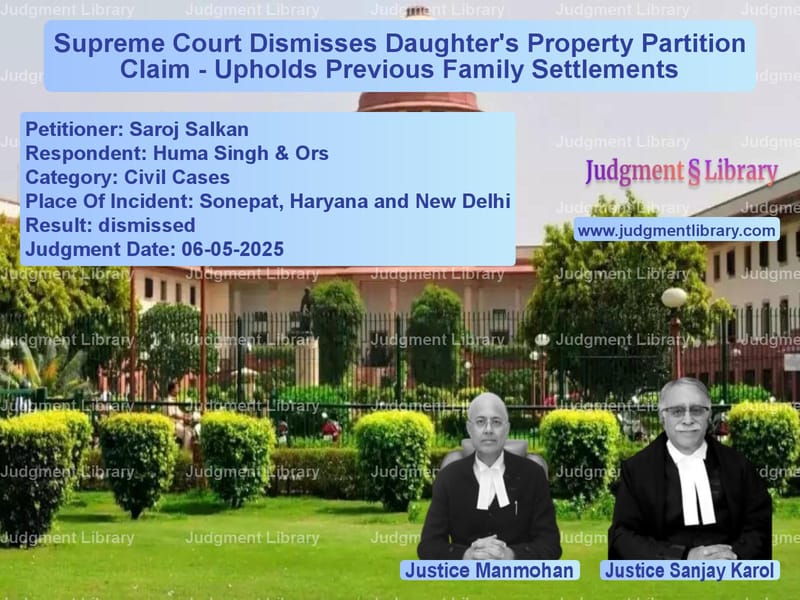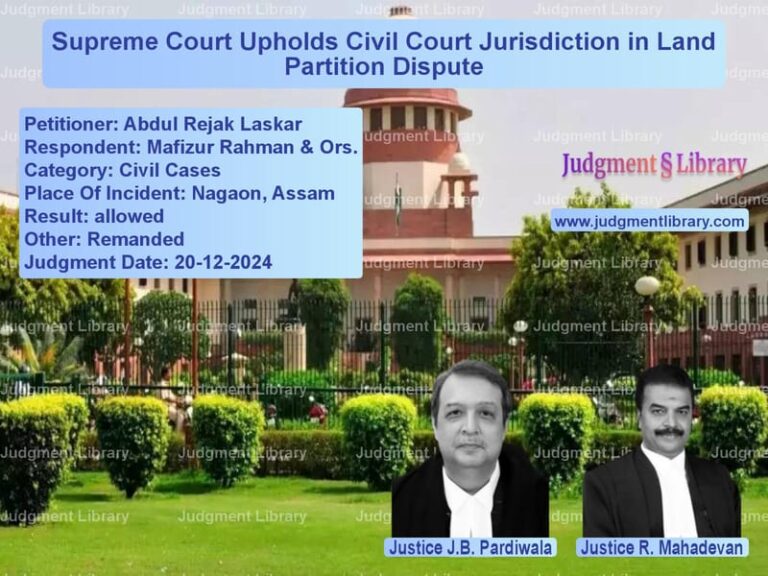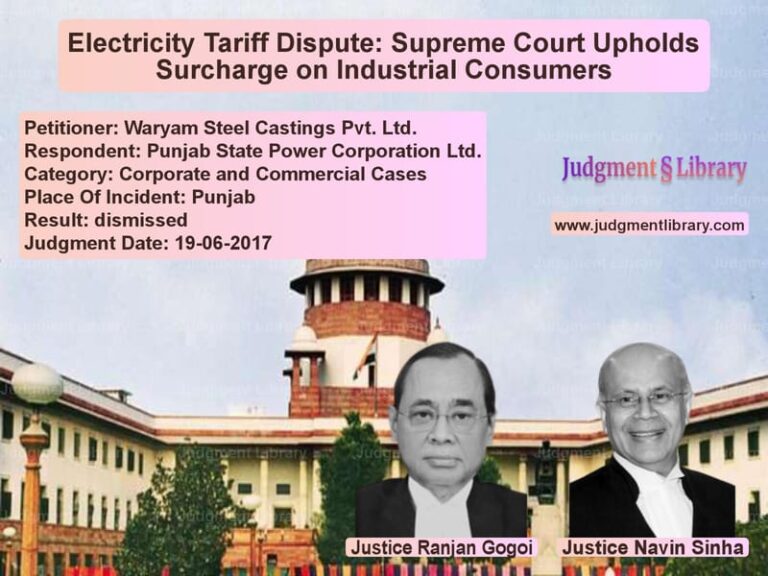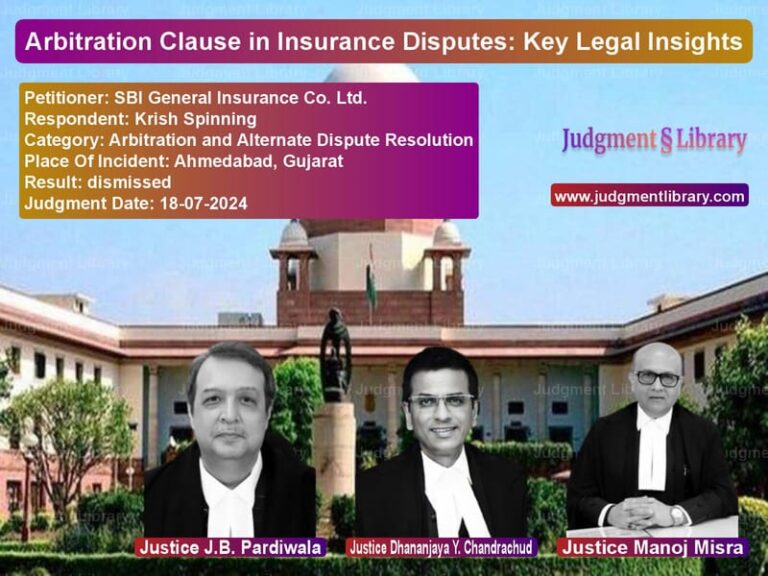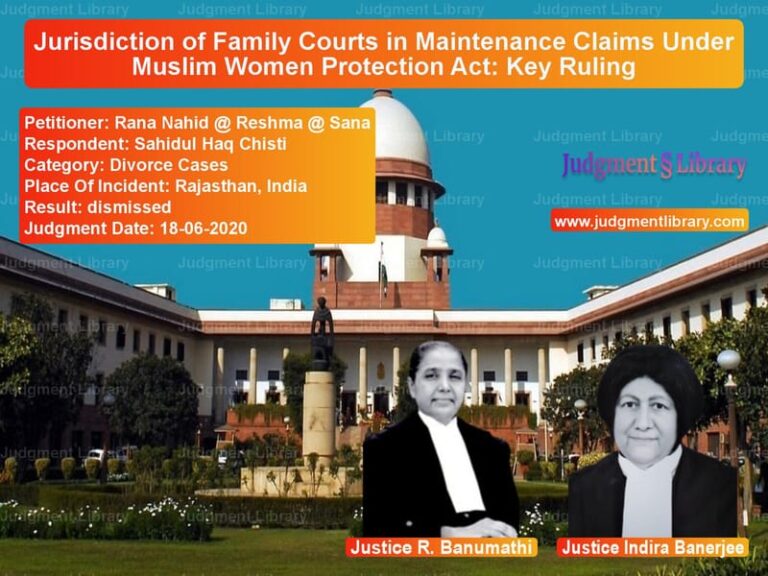Supreme Court Dismisses Daughter’s Property Partition Claim – Upholds Previous Family Settlements
In a significant ruling that underscores the importance of finality in legal proceedings and the binding nature of court decrees, the Supreme Court of India has dismissed a daughter’s claim for partition of ancestral properties that were subject to multiple family settlements over several decades. The case involved a complex web of family disputes spanning more than 50 years, with the central question being whether a daughter could reopen settled property arrangements decades after they were formalized through court decrees.
The legal battle pitted Saroj Salkan against her brother’s family members over five properties originally owned by their father, Late Major General Budh Singh. The properties included agricultural lands in Barota, Kalupur, and Bhatgaon in Sonepat, Haryana, a dairy plot, and a house in Anand Niketan, New Delhi. What made this case particularly complex was the history of four previous lawsuits between family members that had already determined the ownership and distribution of these very properties.
The Family History and Previous Lawsuits
The property dispute had its roots in legal proceedings that began as early as 1972. The first significant case, Suit I filed in 1972, involved Saroj Salkan, her sister Sharda Hooda, and their nephews (sons of their brother Anup Singh) against their father Major General Budh Singh and brother Anup Singh. This suit resulted in a consent decree that partitioned the Barota land among the family members.
However, the story didn’t end there. In 1977, Major General Budh Singh filed Suit II against his two daughters alone, seeking to reclaim the Barota land. The crucial admission in this case came from the daughters themselves, who stated in their written statement: “Though the defendants got a decree in their favour in the year 1970 regarding the land detailed in para No.1 of the plaint but no right or title was recognised or admitted by the our/us authorities and the plaintiff continued to be owner in possession of the said land and as such the decree of the Sub Judge Sonipat dated 7.4.72 was declared a nullity in the eyes of law and could not be accepted upon. The plaintiff continued to be owner in possession of the said land.”
This admission proved fatal to the daughters’ later claims, as the Court noted that by making this statement, they had accepted their father as the absolute owner of the Barota land.
The Current Legal Battle
In 2007, Saroj Salkan filed the present partition suit under Section 6 of the Hindu Succession Act, 1956, seeking division of the five properties. The case went through the Delhi High Court, where both the Single Judge and Division Bench dismissed her claim. The High Court used the powerful tool of Order XII Rule 6 of the Civil Procedure Code, which allows courts to pass judgments based on admissions in pleadings without going through a full trial.
The High Court had strongly criticized Saroj Salkan’s litigation, stating: “We condemn the act of appellant, who in a very half-hearted, almost callous manner; chose to initiate this luxurious litigation wasting the precious time of the legal machinery by setting it into motion without any cause or purpose. The suit contains half-baked facts which are not permissible in law.”
Arguments Before the Supreme Court
Senior Counsel Dushyant Dave, representing Saroj Salkan, made several key arguments. He contended that the High Court could not have dismissed the suit under Order XII Rule 6 CPC, especially without any application from the opposite party. He argued that “the learned Single Judge could not have dismissed the suit under Order XII Rule 6 CPC and that too on its own motion without an application being filed by the Respondents.”
Mr. Dave also emphasized the significance of the amended Section 6 of the Hindu Succession Act, which gives daughters equal rights in ancestral property. He relied on the landmark Vineeta Sharma case, arguing that “the learned Single Judge and Division Bench failed to appreciate that the amended Section 6 had retroactive application.”
Perhaps most importantly, Mr. Dave tried to explain why the sisters had consented to the earlier decrees against their interests: “the sisters, Appellant-plaintiff and Respondent No.6, were young at that point of time and were under the influence of the powerful personality of their late father and therefore agreed to sign papers as directed. According to him, it is a matter of common knowledge that daughters in most Hindu families have little or no say whatsoever.”
On the other side, the respondents, represented by Senior Counsel P.S. Patwalia, argued that the properties in question either didn’t exist or were self-acquired properties of family members. Regarding the Barota land, they contended that “it is settled law that a grant/award is the self-acquired or personal property of the awardee, which implies that Barota land was self-acquired property of Late Major General Budh Singh and not an HUF property.”
The respondents also pointed out that Saroj Salkan had effectively given up her claim to several properties during the proceedings, and that the suit was barred by limitation, especially concerning the Anand Niketan property which had been registered in Anup Singh’s name since 1970.
The Supreme Court’s Reasoning
The Supreme Court, comprising Justices Manmohan and Sanjay Karol, delivered a comprehensive judgment addressing all aspects of the complex case. On the technical question of using Order XII Rule 6 CPC to dismiss the suit, the Court firmly rejected the appellant’s arguments, stating: “this Court is of the view that the submission that the learned Single Judge could have dismissed the suit under Order VII Rule 11 CPC alone and not under Order XII Rule 6 CPC and that too without any application being filed by the Respondents, is untenable in law.”
The Court relied on its recent decision in Rajiv Ghosh vs. Satya Narayan Jaiswal, which affirmed that “Order XII Rule 6 CPC gives a very wide discretion to the Court to pass a judgment at any stage of the suit and that too on its own motion i.e. without any application being filed by any party.”
Regarding the core issue of the previous decrees, the Court was unequivocal in its view that Saroj Salkan couldn’t reopen settled matters: “Since the decrees passed in Suits II and III were never challenged by the Appellant-plaintiff and Respondent No.6 before any competent Court, despite they are having knowledge of the same, they cannot go behind the said decrees in the present proceedings and argue on the basis that they are a nullity and do not bind them.”
The Court particularly noted the significance of the admission made by the sisters in Suit II, which fundamentally undermined their current claims: “Therefore, on a co-joint reading of the pleadings, prayers and judgments/decrees in Suits I and II to which the Appellant-plaintiff and Respondent No.6 were parties along with their father (Late Major General Budh Singh), this Court is of the view that Appellant-plaintiff and Respondent No.6 had accepted their father as the absolute owner of Barota land.”
On the crucial question of the amended Section 6 of the Hindu Succession Act, the Court found that it didn’t apply to the case because the properties had already been partitioned before the cutoff date: “this Court is of the view that the decrees passed in Suits II, III and IV amount to a recognition and acceptance of the fact of partition between the parties prior to 20th December 2004. Consequently, the proviso to sub-Section 1 of amended Section 6 of Hindu Succession Act, 1956 is attracted to the present case.”
The Court also noted the telling fact that Respondent No. 6 (the supporting sister) had herself purchased and sold part of the Barota land, creating an estoppel against her current claims: “as Respondent No.6 had on her own volition purchased part of Barota land from Sanjiv Singh (son of Anup Singh) vide sale deed dated 23rd January 1992 and subsequently sold the said property to a third party vide sale deed dated 12th January 2000, this Court is of the view that Respondent No.6 is estopped from contending that Barota property is owned by a co-parcenary/HUF of which she is a member.”
Broader Implications
This judgment reinforces several important legal principles. First, it affirms the finality of court decrees and the importance of challenging them in a timely manner. The Court emphasized that “a decree by a Court of law is for all purposes final and binding upon all parties, including the appellant, involved therein. Such a decree, if not set aside is for perpetuity.”
Second, the judgment clarifies that while the amended Section 6 of the Hindu Succession Act gives daughters equal rights, it doesn’t automatically invalidate partitions that occurred before the specified date. The Court recognized that “partition need not be effected in any particular/standard format” and that the family settlements in this case, though achieved through declaratory suits rather than formal partition suits, nevertheless constituted valid partitions.
Third, the decision underscores that courts will not permit litigants to reopen long-settled matters without compelling reasons. The thirty-year gap between the last relevant decree and the current suit, combined with the admissions made in previous proceedings, made the current case particularly weak.
The Supreme Court’s dismissal of the appeal brings finality to a family dispute that has spanned generations. While the outcome may seem harsh from the perspective of the daughters seeking to assert their rights under the amended Hindu Succession Act, the judgment prioritizes legal certainty and the finality of settled matters over reopening decades-old arrangements. The case serves as a important reminder that legal rights must be exercised in a timely manner and that courts will not easily set aside long-established property arrangements, even when subsequent legal developments might have changed the outcome if the case were decided today.
Petitioner Name: Saroj Salkan.Respondent Name: Huma Singh & Ors.Judgment By: Justice Manmohan, Justice Sanjay Karol.Place Of Incident: Sonepat, Haryana and New Delhi.Judgment Date: 06-05-2025.Result: dismissed.
Don’t miss out on the full details! Download the complete judgment in PDF format below and gain valuable insights instantly!
Download Judgment: saroj-salkan-vs-huma-singh-&-ors-supreme-court-of-india-judgment-dated-06-05-2025.pdf
Directly Download Judgment: Directly download this Judgment
See all petitions in Property Disputes
See all petitions in Succession and Wills
See all petitions in Contract Disputes
See all petitions in Damages and Compensation
See all petitions in Civil Defamation
See all petitions in Judgment by Manmohan
See all petitions in Judgment by Sanjay Karol
See all petitions in dismissed
See all petitions in supreme court of India judgments May 2025
See all petitions in 2025 judgments
See all posts in Civil Cases Category
See all allowed petitions in Civil Cases Category
See all Dismissed petitions in Civil Cases Category
See all partially allowed petitions in Civil Cases Category

